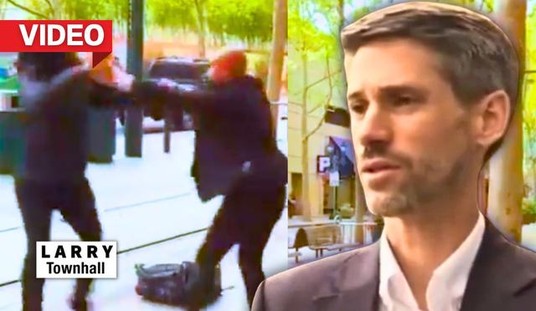On June 23, President Obama fired Gen. Stanley McChrystal, commander of all U.S. and NATO forces in Afghanistan for insubordination. The firing came after Rolling Stone magazine published a profile of McChrystal in which McChrystal dismissed ignoramus Vice President Joe Biden, McChrystal's aides disparaged President Obama's "uncomfortable and intimidated" attitude around military figures, and McChrystal's advisers ripped into Ambassador Karl Eikenberry and Special Representative to Afghanistan Richard Holbrooke, as well as National Security Adviser Jim Jones.
As soon as the profile hit the presses, the media universally condemned McChrystal. The Washington Post suggested that there was "widespread recognition among military and political officials that McChrystal had crossed an almost sacred line in criticizing his civilian chain of command." Andrea Mitchell of MSNBC stated that McChrystal had to go based on his failure to abide by military tradition. Of course, these are the same folks who also believe that soldiers who break military regulations on sexual activity are heroic martyrs, so it is difficult to take their outrage seriously here.
The Obama administration was predictably outraged. Robert Gibbs, his jaw jutting forward like a fat male Keira Knightley, uttered short, clipped sentences, a physical manifestation of President Obama's wounded ego. "The magnitude and graveness of this mistake are profound," said Gibbs, demonstrating a rage this administration has never shown with regard to Iran, the Taliban, or al-Qaida, among others. He questioned whether McChrystal was "capable and mature enough" to lead troops in Afghanistan -- an astonishing critique given that this administration handpicked McChrystal to lead the mission in Afghanistan.
Recommended
Most of all, the Obama administration and its friends trotted out that old meme, "distraction," to explain why it had to get rid of McChrystal. "We're distracting from an enormously important mission," said Gibbs. In fact, said Gibbs, the distraction was actually President Obama's top concern with McChrystal's comments.

This seems unlikely. Then-Sen. Obama made a career from bashing the U.S. war efforts in Afghanistan and Iraq in ways that were guaranteed to distract from the missions. For example, he accused American troops in Afghanistan of "just air-raiding villages and killing civilians." He stated that American troops who had given the fullest measure in Iraq had "wasted" their lives. Distraction from the war effort isn't exactly a foreign concept to President Obama.
No, this wasn't about McChrystal's violation of military protocol. McChrystal was fired because he made it clear to President Obama that he would no longer allow himself to be used as a scapegoat for America's failings in Afghanistan. McChrystal may be in charge of active operations in Afghanistan, but President Obama is the man responsible for the overarching policy failures in Afghanistan -- particularly, his short and unrealistic timeline for withdrawal. And McChrystal made that obvious. As Lt. Col. Anthony Shaffer told me this week when I guest hosted for nationally syndicated radio host Jerry Doyle, "I've heard the president call the Afghan strategy 'Gen. McChrystal's strategy.' Well, truth be told, it's really the president's strategy. Gen. McChrystal is implementing the strategy."
Obama doesn't like when the military gets out of line like that. He prefers when they're silent, like during photo ops at West Point or in Osan, South Korea. He likes the military best of all when he can delegate to them, then throw them under the bus when his strategies fail.
That public relations tactic -- portraying active soldiers' forced silence as assent -- is unjust. You might call it a distraction. There is nothing in the Constitution that necessitates that military leaders remain silent when their positions are actively misrepresented by a president. Respect for the chain of command is obviously a top priority, but McChrystal wasn't refusing Obama's orders -- he was questioning the wisdom of the overall military strategy.
The effect of the blanket "silence" policy for active military members is to bias foreign policy conversations in favor of those who know little or nothing about military matters. President Obama gets to go public with his recommendations on the Afghanistan military situation, despite the fact that the closest he has ever come to military strategy is playing Stratego with Sasha and Malia; he can even claim unanimity among his generals without fear that they will debunk him.
This isn't merely unfair. It's unwise. It leaves the true experts out of the picture when it comes to military policy. And that means that the rubes make the policy and claim that the silent experts agree.






















Join the conversation as a VIP Member